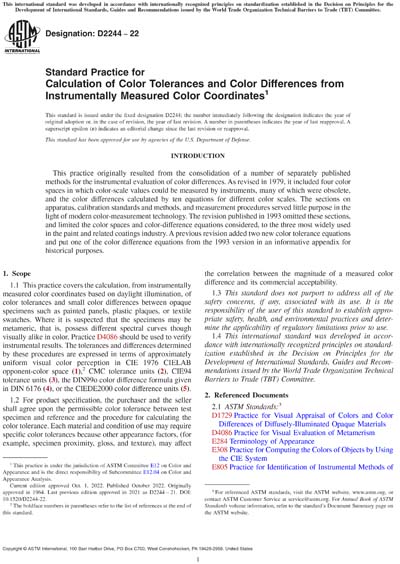Historical
ASTM D2244-22
Standard Practice for Calculation of Color Tolerances and Color Differences from Instrumentally Measured Color Coordinates
1.1This practice covers the calculation, from instrumentally measured color coordinates based on daylight illumination, of color tolerances and small color differences between opaque specimens such as painted panels, plastic plaques, or textile swatches. Where it is suspected that the specimens may be metameric, that is, possess different spectral curves though visually alike in color, Practice D4086 should be used to verify instrumental results. The tolerances and differences determined by these procedures are expressed in terms of approximately uniform visual color perception in CIE 1976 CIELAB opponent-color space (1),2 CMC tolerance units (2), CIE94 tolerance units (3), the DIN99o color difference formula given in DIN 6176 (4), or the CIEDE2000 color difference units (5).
1.2For product specification, the purchaser and the seller shall agree upon the permissible color tolerance between test specimen and reference and the procedure for calculating the color tolerance. Each material and condition of use may require specific color tolerances because other appearance factors, (for example, specimen proximity, gloss, and texture), may affect the correlation between the magnitude of a measured color difference and its commercial acceptability.
1.3This standard does not purport to address all of the safety concerns, if any, associated with its use. It is the responsibility of the user of this standard to establish appropriate safety, health, and environmental practices and determine the applicability of regulatory limitations prior to use.
1.4This international standard was developed in accordance with internationally recognized principles on standardization established in the Decision on Principles for the Development of International Standards, Guides and Recommendations issued by the World Trade Organization Technical Barriers to Trade (TBT) Committee.
Content Provider
ASTM International [astm]






